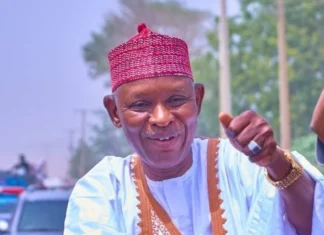By Kristi Pelzel
Legacies of Corruption in the United States and Nigeria
The United States is not immune to a history of corruption amongst police units. Frank Rizzo, Commissioner of the United States Philadelphia Police Department from 1968 to 1971 and Mayor of Philadelphia until 1980, went virtually unchecked, abusing his power, and rose in the ranks with accolated all around.
“The way to treat criminals is spacco il capo” he said, using the Italian phrase for “break their heads.” Rizzo set up a culture that the police could do no wrong. [Officers] believed, when Frank Rizzo was mayor, that they had a free pass.
Although Rizzo’s crimes against citizens went unpunished, his statue was removed from Philadelphia shortly after the murder of George Floyd at the hands of Minneapolis Police in May 2020.
In Nigeria, where the current uprising against police brutality is budding, it is interesting to note that the Nigeria Independence Constitution of 1960 and the Republican Constitution of 1963, established the Nigeria Police Force. However, in January 1966, local police forces were dissolved. Making matters worse, the military assumed the role of policing, and citizen and government relations did not improve.
The Human Rights Violations Investigation Commission of Nigeria was established to investigate “gross human rights violations” from 1966-1990. Only 150 out of the 10,000 recollections of [military police] abuse, received from victims were heard. The commission concluded that the Ministry of Justice played a role in protecting those responsible for committing human rights violations.
These shameful legacies of power abuse are becoming less tolerated in the United States, Africa, and worldwide. The most intolerant, however, are the youths.
The Psychology of Corrupt Leaders
“It is much safer to be feared than loved,” writes Niccolò Machiavelli in ‘The Prince’.
If authority figures believe attaining power requires force, deception, manipulation, and coercion, they operate from a lens that misses the greater and more sustainable power of empathy and social intelligence. In psychological science, power is defined as the ability to alter another’s condition or state of mind using things such as food, money, knowledge, and affection as a reward or punishment. This definition doesn’t account for the balance of power, where social cohesion leads to mass compliance.
Since the beginning of formal policing in Nigeria, law enforcement officers’ corruption has been a fact of life, choosing when to enforce or not enforce laws, using the ideas of reward or punishment as a phycological approach to control. One example is the dismissal of the former I.G., Mustafa Adebayo Balogun, on January 17, 2005, involving N13 billion obtained through money laundering and theft, which later went “missing” and deemed unrecoverable by the courts.
“Power tends to corrupt; absolute power corrupts absolutely,” said the British historian, Lord Acton.
Citizens Confronting Abuse of Power
Protests over reported police violence have increased all over the globe. These conflicts deal a blow to law enforcement and citizens’ relationships, intensified by non-sympathetic and non-proactive leadership. In some countries, leaders will send the police after those demanding accountability for human rights violations, using “national security” laws to criminalize those who speak up, increasing anger among citizens.
Carnegie Endowment for International Peace established a global protest tracker website where it’s reported that protests over police brutality peaked at over one million people in the United States. Today, similar patterns of rising intensity in Nigeria over Special Anti-Robbery Squad (SARS) abuse are occurring.
Not all recent global protests are focused on police brutality specifically, like Lebanon’s recent protests of over one million people against increased taxes on gasoline, tobacco, and VoIP calls on applications such as WhatsApp. However, there are common themes such as inequality, corruption, and political freedom, looking across all global protests from 2019 to today.
Confronting The Special Anti-Robbery Squad (SARS)
The Special Anti-Robbery Squad, created in the early ’90s to confront violent crime in Nigeria, stands accused of targeting youths for money, torturing, abusing, and murdering those who resist.
And it’s clear that this problem is not going to be swept under the rug by mass numbers of Nigerian citizens ready to mobilize for change, gaining a hashtag and celebrity endorsements.
The #EndSARS hashtag gained global attention, climbing to the number one spot for worldwide trends on Twitter as of October 10, and resonating strongly with America’s Black Lives Matter (BLM) movement. Nigeria’s #EndSARS protests have been endorsed and supported by American stars, including Chance the Rapper, Kanye West, and Cardi B. Nigerian artistes such as Tiwa Savage, Runtown, Falz, Davido, Wizkid, and DJ Spinal have come out to the street protests to say “No to SARS.”
The history of abuse of power and corruption, compounded with modern-day incidences of inequality, corruption, and political freedom, has exploded. Nigerian youths know they can mobilize to shift the balance of power, and the high numbers of youth have the will to shape the country according to the future they want for themselves.
The recent unconditional release of all demonstrators arrested during protests and the televised statements made by the president are signs that the people do have power when they come together to unite around a cause. “The disbanding of SARS is only the first step in our commitment to extensive police reforms,” President Buhari has said in a televised statement. “We will also ensure that all those responsible for the misconduct are brought to justice,” he added.
While Nigerian protests and youthful progress seem to be taking place, the United States is still reeling from its own disputes over police reforms. Since the death of George Floyd and the Black Lives Matter movement in the United States, sweeping reforms have been largely pushed by state and local officials. One response from the federal government was legislation aimed at police brutality and racial injustice, addressing national policing practices at a federal level, banning chokeholds, and creating a National Police Misconduct Registry.
However, there are still many unresolved issues with laws such as the legal doctrine known as “qualified immunity,” a law shielding law enforcement from citizen lawsuits.
Police units worldwide face reform challenges, and political, and public sentiment will never be completely balanced on this issue. Still, I think we can all agree that police are supposed to prevent and stop crime, not commit crimes.
Kristi Pelzel is an international communications consultant and advisor working across U.S. and African markets. Her industry experience spans 10 years in broadcast, digital, and social media communication. Kristi holds a B.A. from the Academy of Art University, San Francisco, California, and an M.A. from Georgetown University, Washington, D.C.










